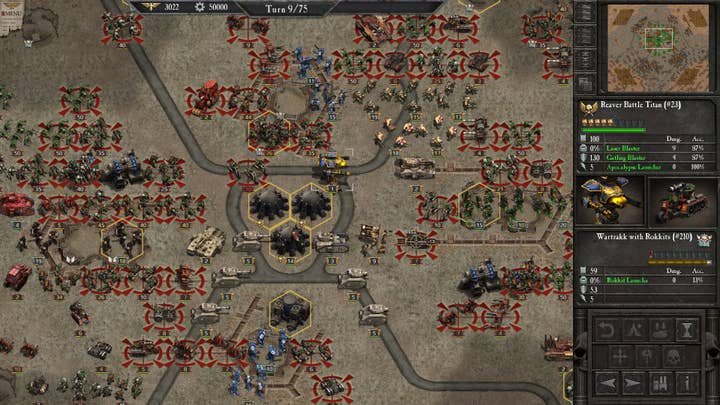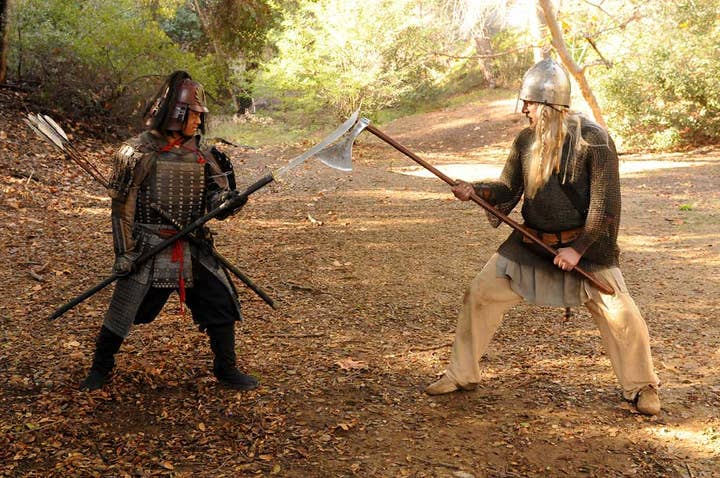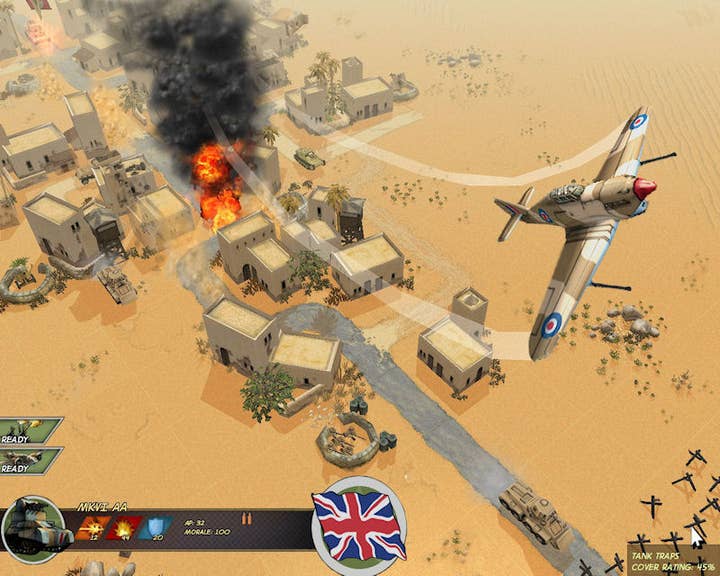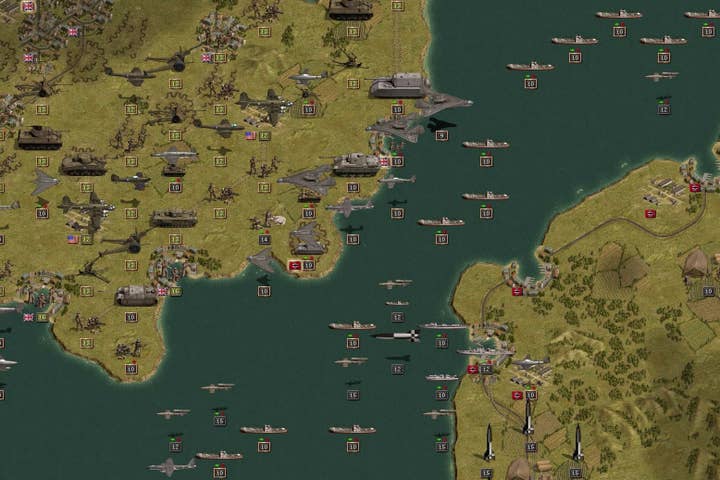"If I'm truthful, I think our player group is...obsessive would be a word"
War sim specialist Slitherine on serving a dedicated market
Sat on the blustery seafront during Brighton's Develop conference, Slitherine's CTO Ian McNeil passes me a manual. It's weighty, a proper stats and hex-based strategy affair, a good inch-and-a-half thick and solidly hardback bound. It could easily pass as a reference guide for the conflict the game covers rather than just an instruction manual. It is, in many ways, the absolute antithesis of the way that most games packaging has progressed. It's also, as Stella Artois used to say, reassuringly expensive.
"95 bucks for that," says JD McNeil, the company MD. "That's the full book and the game experience as well...Our price points are kind of different from the norm in the general video games industry, but as you've heard us say many times, we're not really the video games industry, but a different thing."
Slitherine isn't what you'd call a blue ocean company. It makes complex games about war for a largely male demographic of 25-60 year olds. It experimented with mobile, putting out a successful iOS strategy title in the shape of Battle Academy, but has since pulled back from the tablet market to refocus its attention on PC once more. However, despite selling special edition manuals for nearly a hundred dollars a shot and having a very healthy sideline in printed rule books for the tabletop miniatures series Field of Glory, the war sim specialist is also fully engaged with digital distribution. And it's doing very well for itself.
"Our price points are kind of different from the norm in the general video games industry, but as you've heard us say many times, we're not really the video games industry"
"The way it works is we print the manuals in bulk in Hong Kong, China and ship them across to the warehouse in America, and then in America the rest of this is printed on demand," JD's son and co-director Ian explains, taking back the hefty manual. "The disc, the box, the CD wrap, they're all printed and then the disc is personalized for the person with the order number and their name. That then gets sent out as a full boxed unit. Then there's this more extreme version that we do. We're only doing one or two of these a year, but this game manual becomes the box, effectively. There is no box. They're really collector's-items-for-the-bookshelf-type games."
"It's still keeping up the physical lineup," adds JD. "You get the digital download instantly, and within seven days the full boxed copy turns up on their doorstep. A lot of the guys in our genre still want this tactile feel from the product."
Having grown up in a house where boxes full of cardboard and complicated counters with names like "Battle for Arnhem" and "Source of the Nile" lined the shelves, I can fully understand this appeal. Even now, my dad's house is crammed full of boxes of Zouaves, Hussars and Kubelwagens, all accompanied by the dense rulebooks which govern their movement and firepower. But even though he's pretty much Slitherine's direct target audience, even he downloads games. Slitherine has him covered too, thanks to a merger with online digital retailer Matrix five years ago.

"The original game plan for us was that the writing was effectively showing on the walls, in terms of retail. Matrix Games had pioneered the digital distribution market. They had got that pretty much sorted. By this time, we were now selling our products digitally through their platform, and it was fairly clear to us that organic growth in the business, to go from zero digital, to go from retail to digital, would be a fairly lengthy process, and an expensive process. Doing the deal for Matrix was a leap forward. It put us in a position that it would have taken years to achieve in any other sense.
"Effectively, at the time that we did the deal, Matrix were arguably a bigger company than us, so it was a kind of a reverse takeover. It was a merger to all intents and purposes, but it's worked out very well for us. It's opened a lot of doors going forward, so we're very happy with that. We're five years into that, and we're also dealing with the decline of retail here, but the business keeps growing.
"The business put on its own turnover again in that year (2010). It's put that on, at least, every year since"
"The business put on its own turnover again in that year (2010). It's put that on, at least, every year since. In that initial year it doubled, and then in the following year it was a third again. Over the past five years it's just added that level of volume of business on. If anything, we're struggling to cope. We're trying to recruit at the moment."
As well as online sales, Slitherine also sends its boxes to the large and well-attended wargaming shows which litter Europe and the US, selling directly to audiences there via preferred partners. As Ian explains, they have plenty of routes to market, however niche it is.
"We also do dealer stores," he says. "We have a system where people and museums or hobby shops, they can order online and then we'll do the print on demand and dispatch to them. They get a reduced rate, so we have a network of dealer stores scattered around the world. Obviously, we've got Steam as a route. Our websites are the primary source of direct sales, which are our primary revenue source, and then you have the platform specific routes to markets, obviously. iOS, Android, Xbox. We released an Xbox 360 game last year."
"We're looking at more console stuff for the future," chips in JD, "but the console market's again changed. There aren't avenues for all of our products, that's never going to be the case, but there are enough of the products that we think will find a route to market on the consoles. We're looking at that as well now."

The company has also just trialled what it hopes will be a fairly major deal with Amazon, providing boxed, physical copies via the online giant, and a partnership with Humble Bundle. In particular, says Ian, that was a difficult choice, not least because the firm doesn't really believe in discounts.
"In the past, we've always been very reluctant to allow others to sell our products. Dissipating the market, expanding it in a direction we don't want to see it go, but, more importantly, not being to control the price points. That's huge in our business, and we have to have a fairly direct control of that before we're comfortable working with anyone."
Owning a market like war sims is a bit of a boon. Not only are your audience generally very dedicated, well off and engaged, they generally don't mind paying full price if it means they get exactly what they're after.
"It's kind of a luxury and a necessity of working in a niche," says JD. "If we went down that route of discounting very, very quickly, then you're going to hit saturation. Our job is to maximize revenue for the developers, and if we're not managing the price properly, then they basically end up getting less that they would. They may have sold lots of units, but volume doesn't matter, it's the value that they generate from them. That said, we had a Steam flash sale on Panzer Tactics that sold staggering numbers this weekend."
"Our job is to maximize revenue for the developers, and if we're not managing the price properly, then they basically end up getting less that they would"
"We don't do them that often," adds Ian, by way of a caveat. "The last time Panzer Corps had a sale was the Christmas sale last December, so it's about seven or eight months ago. We find if you manage them properly and keep them far enough apart and don't discount too heavily, they don't hurt the ongoing sales. If anything, we often find that, after a sale, the sales are higher than they were before the sale, because just a raised awareness and visibility of the game."
Talking about price points and the dangers of devaluation, the conversation naturally turns to iOS and Android. Why, given the success of Battle Academy and the promising noises Slitherine made about the mobile platform, is that not something it's pursuing more actively?
"We were very focused on tablets, we had a huge run with Battle Academy," says JD, frankly. "It was one of the first strategy games out there. We got slaughtered for the price point, in the press and everywhere else, and the game went like a train. Absolutely. People were crying out for it. Of course, we made it cross-platform playable, so you could play on the PC, and we had an awful lot of requests from people: 'Can't we get a discount? We've got it on the PC, we want to travel on the train, going to work.'

"Nothing you can do about that, but the game was significantly cheaper on tablet than it was on PC. Same game, exactly the same game. As things have moved on, we get a lot of reaction about that. A consequence of that is we no longer release simultaneously on iOS and PC. We will release on iOS, but it's afterwards. We establish the price point and the value, and it's almost like a discount when it gets on the iOS."
If iOS caused some awkwardness, then its Google counterpart was the drunk who was thrown out of the party early for smashing up the buffet. JD doesn't mince words.
"Android is just a disaster area. It's just a mess. Absolute mess. We've got some product up there, but we, frankly, don't even bother looking at it in our statistics. It's irrelevant. iOS is still a factor. Something like 14 percent of our business is still through iOS. In terms of where we thought it would be, if we'd had this conversation 18 months ago, two years ago, we were giving a different message entirely to our developer partners. What we're now seeing is do not compromise on the PC build. Do not take into your account that is going to go on the iOS. We have to factor the UI in, do everything else to multiple platform it. We're no longer doing that. The advice now is, 'This is a PC product. You make it the best PC product you can, and then we'll port it.'
"Android is just a disaster area. It's just a mess. Absolute mess. We've got some product up there, but we, frankly, don't even bother looking at it in our statistics"
"The Apple platform is flooded, unless you get some sort of route to market. That's where we're very fortunate. Because we have this niche audience, as you put it...and it is a niche audience, it's a different audience, so almost immediately, we put something out, they know about it. It's one of the advantages of the world we inhabit. We deal with people who dress up, go out play in a muddy field. It's that sort of people. Historians, guys who play with tabletop war games, and of course a video game version of it is ... everyone plays video games now. Getting that route to market, and the knowledge, and the word of mouth across the audience is invaluable to us.
"Everyone keeps telling us that the audience is dying. But they're being replaced. There are still 25 to 65 year olds, doesn't matter how you play it. That's the demographic. If I'm truthful," he says, searching for a diplomatic term, "I think our player group is...one of the traits that you see in it...well, obsessive would be a word to choose."

